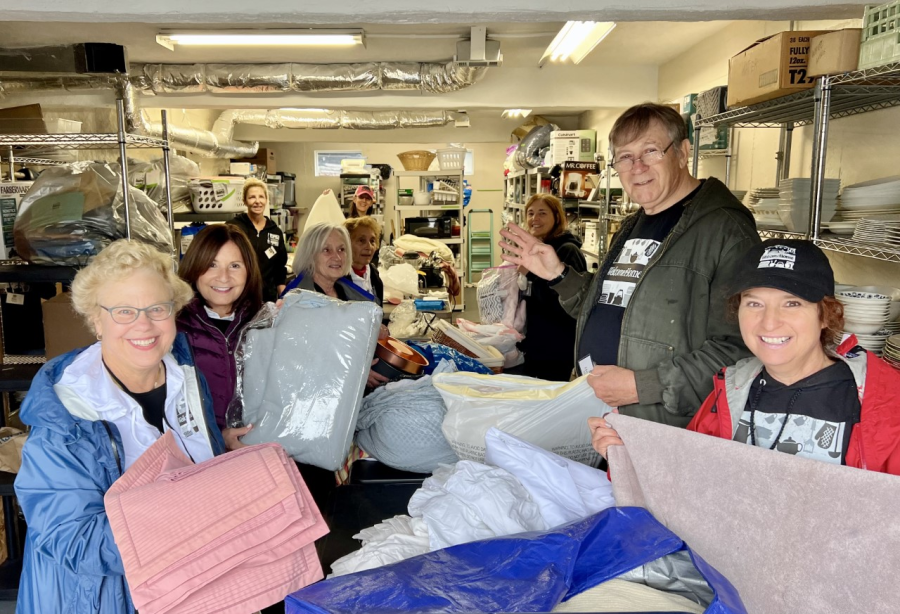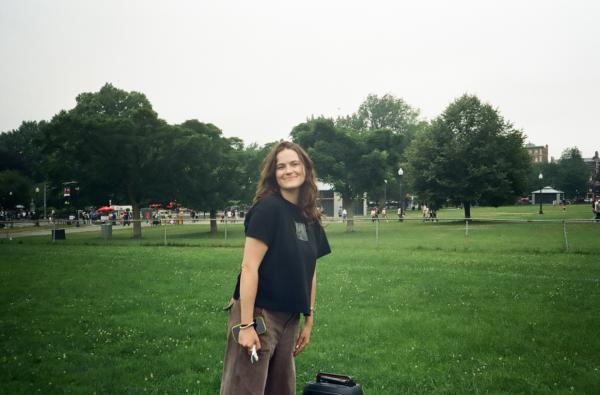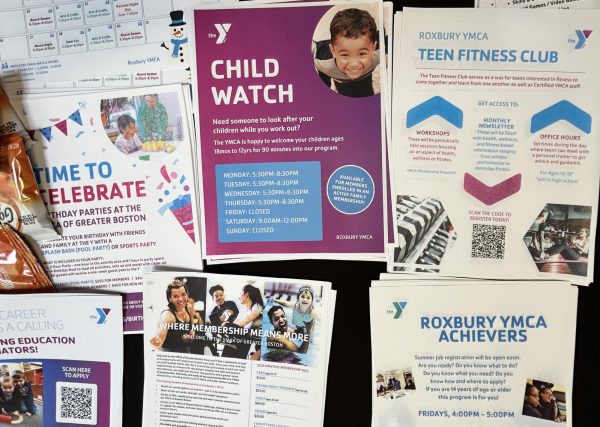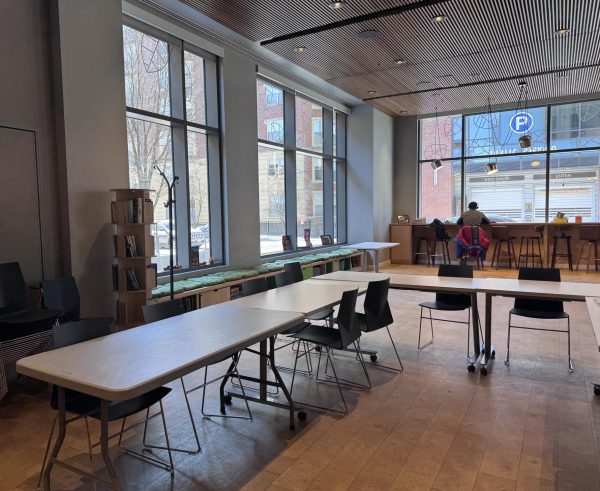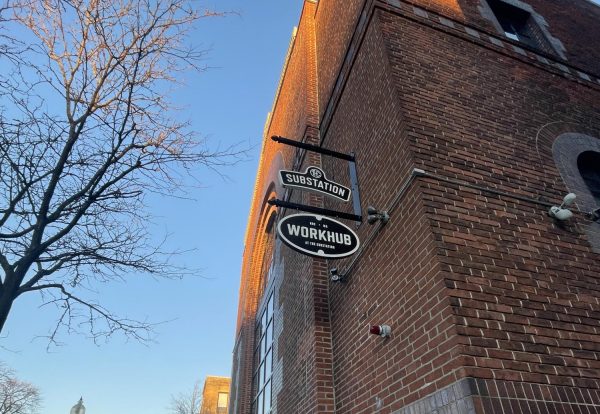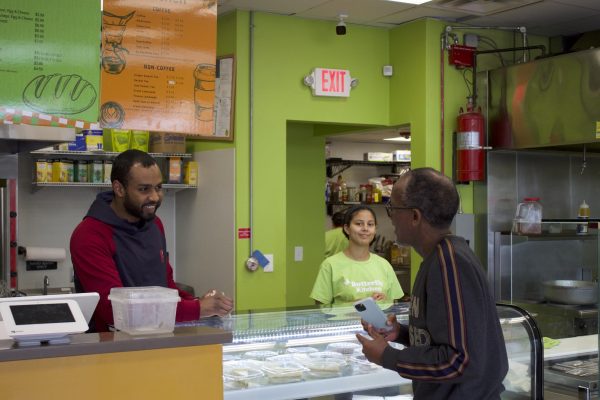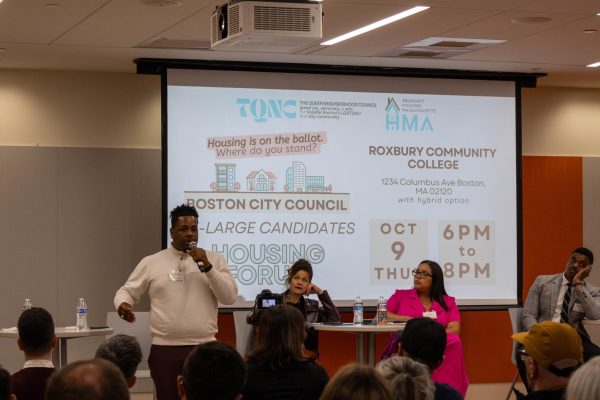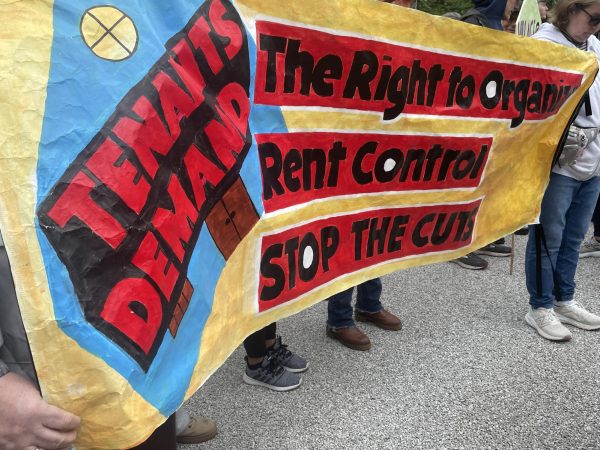Welcome Home, a home goods pantry, is uplifting families and bolstering communities
“There’s something beautiful about that amplification. You give one person a blanket; how many nights will they sleep peacefully with a smile on their face?”
Photo: Sabira Khalili
Welcome Home, a Newton-based nonprofit founded by Julie Plaut Mahoney, provides about 75 struggling families with like-new donated household goods each month.
New immigrants, participants in domestic violence survivor programs, and families relocating from shelters into affordable homes are just some of the clients, said Mahoney.
The main mission of Welcome Home is to collect gently-used home goods such as linens, pots, pans, cleaning supplies, dinner, and silverware. Donated items are then distributed to those in need.
Welcome Home received the 2022 Green Newton Nonprofit Leadership Award in May in recognition of its role in community and climate protection. The group’s work not only helps those in need but also keeps useful household items in circulation and out of landfills. For three years, the nonprofit was in the basement of Newton Centre’s Trinity Church and has since relocated to a much bigger space on Washington Street in West Newton.
The organization’s 80-plus volunteers – women, men, and children – unload, sort, organize and repack donations to keep the location stocked. And some take items home too. Partnering with a network of social workers, service organizations, and agencies allows the organization to extend its reach. Through these partnerships, Welcome Home supplies basic home goods for veterans’ residences and maintains a presence at the Newton Food Pantry, among other ventures.
Mahoney has served as Welcome Home’s executive director and co-founder since the non-profile launched. Prior to Welcome Home, Mahoney, born and raised in Newton and still there now raising her three kids, spent 20 years working in the elder care field, including Newton at Home, an end-of-life care facility.
On a recent rainy day in Welcome Home’s 1600-square-foot office space, Mahoney talked about her motivations behind the foundation of the nonprofit and how it became a dream project for her. This discussion had been edited and condensed for clarity.
What led you to Welcome Home?
I trained to be a professor of sociology, then when I was done with graduate school decided not to be a professor of sociology, so I went into applied work in elder care and worked with older adults at end-of-life. So, when they were dying and older adults who were wishing to remain independent at home. In that line of work, I was just in one situation after another where there were condominiums and homes and houses of all descriptions with a lot of goods. It became a compelling question to me, an issue of where we’re all these goods going to go and how were we going to give them another life to people moving to this country, rebuilding after fires, leaving violent domestic situations – any situation where someone was rebuilding? So, I thought to myself, “whom do I want to do this with and who is super smart and super warm?” I called Mindy Peckler [co-founder of Welcome Home], and she said yes.
How does your background relate to your position?
My answer to this is two things: One is my past work background. Twice I started and ran volunteer programs. This is the largest, but I do have a background in doing this elsewhere. And the second is I think in my professional background, most of the individuals and families who I worked with were in some way in transition. They had an older adult moving from a nursing home. They had someone dying. They always have someone transitioning and a lot of transitions going on, so working with people during times of transition is remarkably familiar to me, and that is what is going on here.
What is your most successful program, and why? Give me your best example of the way you have seen your organization’s work make a difference.
We started a policy with someone who has recently arrived. We serve you immediately because we have hundreds of people waiting for goods, but you went to the top of the list because serving new immigrants is at the core of our culture. This is one of the things that I’m most proud of when I think about it …. We did not even know how important it was going to be at the time, so we did not ask for any forms or documentation from any of our clients. The dignity we can provide them by not requesting paperwork, filling out forms, and letting them just come in and shop as they would in any store really has provided a level of kindness to our clients that I do not think we could have ever even anticipated.
What are the areas of opportunity for your organization? What could you do better?
We need to serve the number of people that we can do well while still operating in an organized way. It does not help more people if we are so busy and it is so demanding. We think that if it takes another couple of weeks for us to serve someone, while that is painful to us, we can keep going, and that is where we could do more. We moved into our current space in April, and this is exponentially more space than we have had for the last five years, so we are certainly able to serve more people faster.
Is there anything that you wish more people knew about your organization or the issues you are trying to solve?
To give an example: If we get a blanket that is stained, we are not going to give that to a person, but we will give it to an animal shelter, or if it is not in good condition, we make a significant effort to recycle it at a fabric recycling location. I wish people understood more about the importance of the quality of what they give to others.
Where does most of your funding come from? What percentage of your budget comes from private donations, and what do private donations help you to do that your other sources of funding do not cover?
So, because we do not require any forms or documentation from our client, we are not eligible for a lot of funding. So, most of our funding comes from private donors. We do two fundraisers a year: one is around Thanksgiving, and one is around Mother’s Day. In those two times, we have asked for financial donations, we also are extremely fortunate to have a wonderful relationship with our state Sen. Cynthia Stone Creem, who asks for money in the state budget for several nonprofit organizations that we are one of. But really, it is private donors.
What are your most urgent needs?
We are always asking people to donate goods. So, it gets a little interesting because some people say, ‘well, I just gave you a blanket; I am not going to write a check.’ We are heavily reliant on
private individuals who have a good sense of what we are doing and how we are doing it and want to see us continue. It is impactful when people come to see what we are doing because then it adds an extra layer of understanding, like, ‘Oh, now I get it.’ They need to understand that it is not free.
If more people wanted to get to know the organization better, what are the best ways to learn more?
So, we really do not do any advertising. It is mostly word-of-mouth. They sometimes will go on a Facebook page or somewhere they will find [us] online. People who have heard of us will certainly recommend us. We really have never had a shortage of donors. Every week we have three drop-offs so we can see they are all full, and sometimes there is a wait even for them.
How do you measure and report on the effectiveness of your programs? Do you have other plans to change or improve your evaluation process?
We have made a noticeably big effort this fall to get a better handle on how many people we’re serving, how many children, and how many women, and we put our resources of various kinds into improving that system because we need to be able to answer how long is the wait. These are the things that people want to know: Where do our clients come from? Not from which countries of origin, but how far are they coming? Are they coming from Southern New Hampshire, or are they coming from Cape Cod? A lot of that is anecdotal because we do not require anybody to give us a form to state their address, so we made a big effort this fall to improve that system, and it’s showing already because now we have those numbers at our fingertips.
What are the main obstacles and challenges that stand between you and your mission, and how do you plan to overcome them?
The challenge is being able to serve more people, and the way we are going to overcome that is by bringing in more goods and continuing the efficient processes that we put in place to serve those people.
How would you compare your programs and results to others working in the same field?
We don’t believe in reinventing the wheel. So, we have looked at many other organizations that do similar things to us, whether it be home goods or clothing, or toys. To see their best practices and try to use their best practices. Some of them fit in with our model, and some of them don’t, but we certainly look to others or other successful organizations to learn how to do things in the best way possible.
What are your staff good at? What are the gaps?
That is an interesting question. Our volunteers are incredibly strong and treat this like a job, so even though we do not get paid, I have to say our volunteers take this very seriously. You know, we have one volunteer – he is good at working on electrical appliances, so he will come in every week and take whatever appliances might not be working perfectly, bring some home and try to fix them and get them in better shape. If he can, will bring some back, and then they will go to a client or recycle.
What are the steps you are taking to achieve your strategic goals?
We tried our best in what we are calling a two-week push to serve as many people on our waiting list as possible before Thanksgiving. That means more shifts during which clients are picking up. You asked about strategy, which makes us have a lot of things that we intend to do this weekend.
How do you work with peers who address similar issues, and how do you mobilize others around your mission?
We have a genuinely nice relationship with a nonprofit that brings blankets to the streets of Boston three nights a week. So, we provide them with many dozens of blankets. We provide the Newton food pantry with home goods every week, lots of them. We do not want goods coming in and staying here. So, we work hard on our relationships with other nonprofits to keep goods flowing. The other way we work with nonprofits that I think is amazingly effective is for volunteers. We have a monthly volunteer team meeting, and at most of those meetings, we invite a representative from one of the volunteers to have a much broader view of where our work fits in the constellation of nonprofits in this area. We are having a speaker at our meeting on Thursday from … one of the largest local domestic violence organizations … It supports us, so when we have people who have come from their program or other violent domestic situations, we can do what we do better because we understand more.
What will be your message to those who are not interested in this idea of donating what they do not need?
I am of the mind that everybody has something to give, whether it is an apple or a blanket or their time or their ability to speak Spanish, or their ability to lift heavy objects. It is our job as an organization to encourage people by figuring out what they can bring to the table. They can go somewhere else, but you know, I think if you have a blanket yourself and you want to pass it to others, I am sure you can figure out a way to give it to others.


